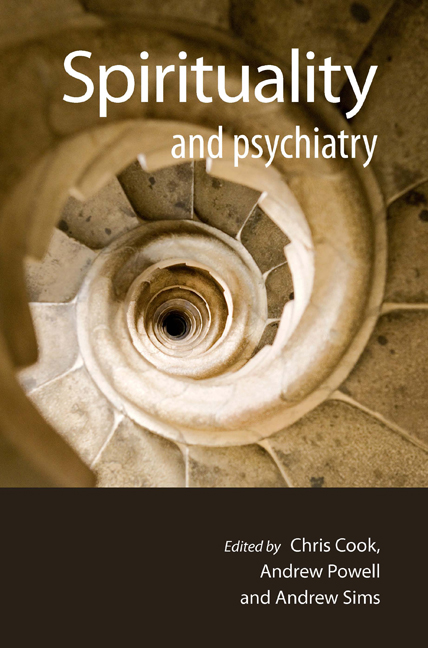Book contents
- Frontmatter
- Contents
- List of contributors
- List of tables, boxes and figures
- Foreword
- Preface
- The Spirituality and Psychiatry Special Interest Group of the Royal College of Psychiatrists
- 1 Spirituality in psychiatry
- 2 Assessing spiritual needs
- 3 Psychosis
- 4 Suicide
- 5 Child and adolescent psychiatry
- 6 Psychotherapy
- 7 Intellectual disability
- 8 Substance misuse
- 9 Neuroscience of the spirit
- 10 Spiritual care in the NHS
- 11 The transpersonal perspective
- 12 Religion and religious experiences
- 13 Pathological spirituality
- 14 Ageing
- Index
5 - Child and adolescent psychiatry
- Frontmatter
- Contents
- List of contributors
- List of tables, boxes and figures
- Foreword
- Preface
- The Spirituality and Psychiatry Special Interest Group of the Royal College of Psychiatrists
- 1 Spirituality in psychiatry
- 2 Assessing spiritual needs
- 3 Psychosis
- 4 Suicide
- 5 Child and adolescent psychiatry
- 6 Psychotherapy
- 7 Intellectual disability
- 8 Substance misuse
- 9 Neuroscience of the spirit
- 10 Spiritual care in the NHS
- 11 The transpersonal perspective
- 12 Religion and religious experiences
- 13 Pathological spirituality
- 14 Ageing
- Index
Summary
How many loved your moments of glad grace,
And loved your beauty with love false or true;
But one man loved the pilgrim soul in you,
And loved the sorrows of your changing face.
W. B. Yeats (1893)Every child has a story to tell; some are joyous, some painful, most a mixture of the two. It is the psychiatrist's privilege to listen to that story and to help the child retell it, without excuses, to whoever it concerns.
Robert Coles, the great paediatrician-turned-psychotherapist, spent years listening to the stories of children across the world, in schools, homes and all their private places. In The Spiritual Life of Children (Coles, 1990: p. xvi), he describes them as ‘seekers … young pilgrims well aware that life is a finite journey and as anxious to make sense of it as those of us who are farther along in the time allotted to us’. The concept of life as a journey was one that Liam understood (case study 5.1), but it has many implications. What sort of a journey is it and what goal is the pilgrim child journeying towards? What blessings and hardships might he or she encounter along the way? What outside influences might be brought to bear and how might a therapist be called upon to help? This chapter is an attempt to explore those questions and to work out what they might mean in the triangle between children like Liam, the therapist and the outside world.
What sort of a journey is life and what are its goals?
The study of spiritual development in childhood was frustrated for decades by its association with religion and the attitudes of psychoanalysts who took their cue from Sigmund Freud's dismissal of it as an obsessional neurosis derived from infantile wishes. True, Carl Jung thought that religion could be an aid towards personal and social moral values and the object relations school saw it as a transitional bridge from self to others via ‘god images’.
- Type
- Chapter
- Information
- Spirituality and Psychiatry , pp. 81 - 100Publisher: Royal College of PsychiatristsPrint publication year: 2009

